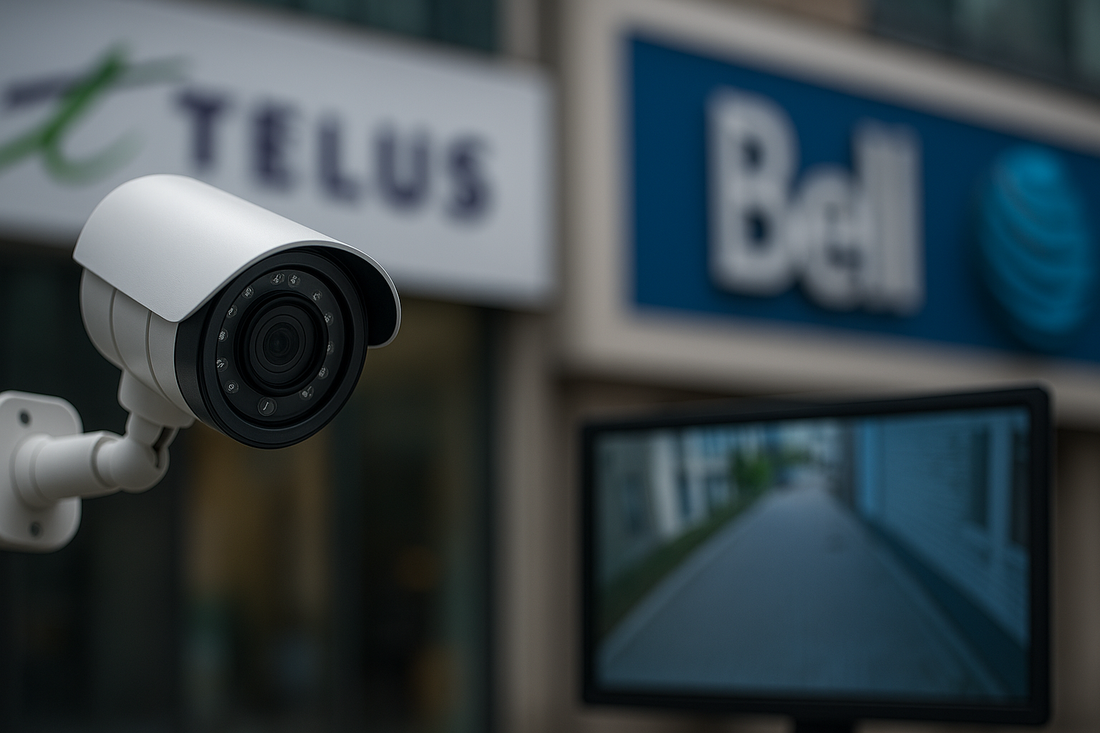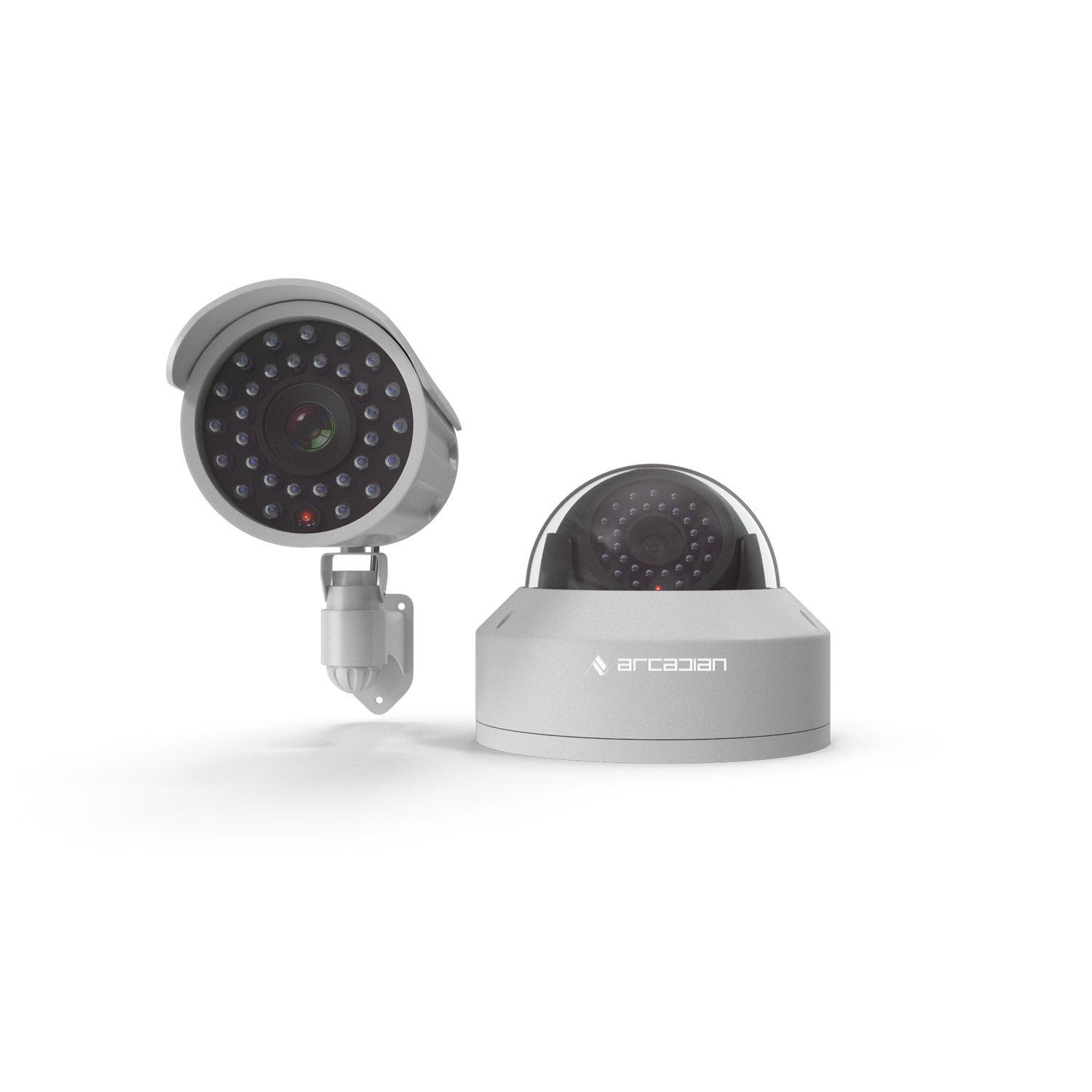The Truth Behind Bell, Telus, and ADT Security
Many telecom and security giants promise AI-powered protection, but what they really offer is outdated hardware, misleading claims, and confusing bundles. This exposé reveals the truth about Bell, Telus, ADT, and how ArcadianAI sets a new standard for smart, ethical security.

How Big Brands Mislead You With Cheap Cameras, Fake AI, and Bundled Traps
Introduction
In a world increasingly reliant on video surveillance for safety and peace of mind, it’s tempting to trust established brands like Bell, Telus, and ADT for your security needs. These companies have name recognition, national reach, and enticing bundle offers. But behind the shiny marketing campaigns and low monthly fees lies a system plagued with subpar hardware, misleading cloud and AI claims, and hidden service limitations. This article uncovers the truth behind these telecom and security giants, showing why their systems often offer more illusion than protection.
The Rise of “Cheap Security” by Big Brands
As the demand for home and business security surged in the 2010s, telecom providers and legacy alarm companies saw an opportunity to capitalize. Companies like Bell and Rogers in Canada and ADT in the U.S. began bundling smart home security with their existing internet or mobile offerings. This strategy seemed beneficial for consumers—one provider, one bill, one system. However, the result was a fragmented and unreliable security experience.
Their goal? Lock users into long-term contracts and generate predictable revenue—not deliver best-in-class protection. This section explores how bundling became a trap rather than a convenience.
Company Profiles & Business Models
Bell Smart Home (Canada)
Bell Smart Home services typically include cameras, motion sensors, thermostats, and alarm systems—bundled with Bell's internet and mobile plans. However, much of the infrastructure is powered by Vivint or Alarm.com under Bell branding. While marketed as a “cloud security” system, most footage is recorded locally and uploaded in bursts—if at all.
-
Storage: Default plans store footage for only 7 days, and upgrading costs extra.
-
AI: Motion detection is misrepresented as "AI analytics."
-
User Complaints: Frequent hardware outages, lack of integration with third-party systems, and poor customer support.
-
Source: Reddit r/Canada and r/HomeNetworking threads regularly highlight negative experiences with Bell’s smart home system.
Telus SmartHome Security (Canada)
After acquiring ADT Canada, Telus rebranded its home security platform. The backend is still operated by Alarm.com, but Telus markets the solution as its own. The result is a system that looks modern but performs like a decade-old solution.
-
Storage: Most video is stored locally on a hub or base station, not in the cloud.
-
AI Claims: Telus advertises “smart motion detection,” but these are basic pixel-based alerts.
-
Bundling Strategy: Customers are encouraged to subscribe by offering insurance discounts, free installation, or limited-time offers.
-
References: https://www.telus.com/en/smarthome-security
ADT (U.S. & Canada)
The most recognizable name in home security, ADT has partnered with Google Nest to appear modern, but behind the scenes, much of the infrastructure is outdated.
-
Contracts: 3- to 5-year commitments with steep cancellation penalties.
-
Hardware: Still dependent on local DVR/NVR in many regions.
-
Cloud Storage: Frequently marketed as cloud-based but typically involves local storage with delayed uploads.
-
User Reviews: Trustpilot and BBB show thousands of complaints about billing, installation issues, and customer support.
-
Source: https://www.bbb.org/us/fl/boca-raton/profile/burglar-alarm-systems/adt-0633-92001339
Rogers Smart Home (Canada)
A weaker competitor to Bell and Telus, Rogers Smart Home Monitoring focuses on entry-level equipment with similar bundling strategies. AI features are minimal and often misrepresented.
-
Hardware: 720p–1080p cameras, no audio, limited night vision.
-
Bundling: Linked to Rogers Ignite internet plans.
-
User Reports: Customers report system failures and lack of responsiveness.
The Fake Cloud & AI Claims
These companies advertise “cloud storage” and “AI-powered alerts,” but a deeper technical inspection reveals otherwise:
-
Cloud: Most systems store footage on a base station or NVR and only upload clips if motion is detected. Full cloud storage is rarely enabled by default.
-
AI: The so-called AI is often just motion detection triggered by pixel change.
-
Example: A Bell ad claims AI will "notify you of threats," but in reality, users get alerts when trees move or lighting changes.
The Insurance Incentive Trap
A key marketing strategy is the promise of insurance discounts. By installing a monitored security system, customers can supposedly save on premiums. But this often becomes a trap:
-
No Accountability: When footage is lost or overwritten due to poor storage, customers can’t prove incidents.
-
Blame Game: Telecom providers blame the hardware vendor; the insurer blames the customer.
-
Example: A Reddit user shared their insurance claim was denied because their Telus camera only kept footage for 5 days—and the incident happened on day 6.
Bundling to Blur Responsibility
Telcos intentionally blur the lines between services—security, internet, mobile, smart home—to confuse the customer and create dependency.
-
Support Issues: Security support is often outsourced and undertrained.
-
Long-Term Contracts: Many users are unaware they’ve signed a multi-year commitment until they attempt to cancel.
-
Responsibility Gaps: When issues arise, no one takes responsibility—"Call the hardware vendor," "That’s a network issue," etc.
Real Customer Experiences
Reddit Complaints
-
"ADT didn’t even show up for my scheduled install, but still charged me."
-
"Telus smart camera never uploaded anything, but they claimed it was cloud."
-
"Rogers took 6 weeks to replace a broken hub and I had no security in that time."
Trustpilot and BBB
-
ADT: 1.1 stars on Trustpilot (over 4,500 1-star reviews)
-
Telus: 1.3 stars on BBB with constant reports of poor technical support
What They Don’t Want You to Know
-
Hardware Origin: Most cameras are cheap, imported devices with low bitrate and limited firmware.
-
Video Quality: Often limited to 720p/1080p with poor night vision and no audio.
-
Retention: 7 days or less, unless you pay for more.
-
AI: No face recognition, object detection, or forensic capabilities—just basic motion.
ArcadianAI vs. The Giants
A Side-by-Side Comparison
| Feature | ArcadianAI | Telus | Bell | ADT |
|---|---|---|---|---|
| True Cloud Recording | ✅ | ❌ | ❌ | ❌ |
| Real AI Analytics | ✅ Ranger | ❌ | ❌ | ❌ |
| Camera Quality | 4K/2K Supported | 1080p | 720p–1080p | 1080p |
| Contract-Free | ✅ | ❌ | ❌ | ❌ |
| Transparent Pricing | ✅ | ❌ | ❌ | ❌ |
| Multi-Site Friendly | ✅ | ❌ | ❌ | ❌ |
Ethical and Functional Risk
The biggest problem isn’t just technical—it’s psychological. These companies sell a false sense of security. Customers believe they’re protected when, in fact, footage may be missing, unreadable, or irrelevant.
-
Legal Risk: In lawsuits or insurance cases, unusable footage can harm your claim.
-
Moral Concern: Marketing basic tech as "smart" or "AI" is deceptive.
What Honest Security Looks Like
A real solution should offer:
-
✅ AI that explains, not just detects
-
✅ Real-time cloud access
-
✅ Honest pricing
-
✅ 30+ day storage as standard
-
✅ Audio and video intelligence
-
✅ Regular updates, not legacy software
Final Thoughts
Telcos and legacy alarm providers have mastered the art of bundling, upselling, and obfuscating. But when it comes to real security, the truth is unavoidable: they’re offering you the illusion of protection. You deserve better. ArcadianAI offers a clear, transparent, and intelligent security system built for people who want results—not marketing.
Call to Action
Want a real-time, AI-powered security system that doesn’t fake the future? Try ArcadianAI with Ranger today.
👉 Get a Demo
References

Security is like insurance—until you need it, you don’t think about it.
But when something goes wrong? Break-ins, theft, liability claims—suddenly, it’s all you think about.
ArcadianAI upgrades your security to the AI era—no new hardware, no sky-high costs, just smart protection that works.
→ Stop security incidents before they happen
→ Cut security costs without cutting corners
→ Run your business without the worry
Because the best security isn’t reactive—it’s proactive.







